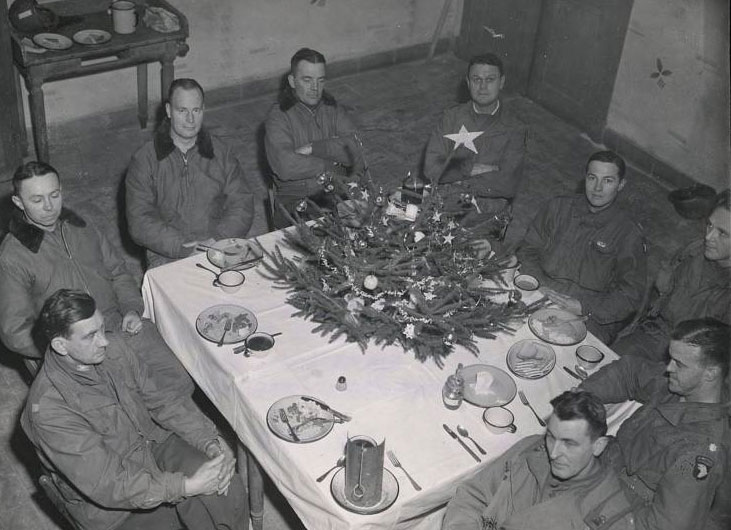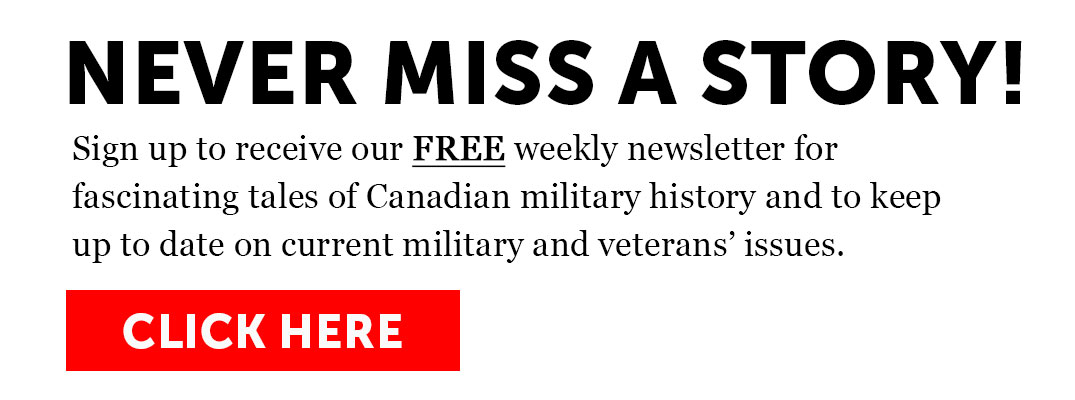
Brigadier-General Anthony C. McAuliffe, artillery commander of the 101st Airborne Division, gives pilots last-minute instructions in England for Operation Market Garden on Sept.18, 1944. McAuliffe would go on to lead U.S. forces in the Ardennes. [Wikimedia]
Or close the wall up with our English dead. . . .
Be copy now to men of grosser blood,
And teach them how to war. And you, good yeoman,
Whose limbs were made in England, show us here
The mettle of your pasture; let us swear
That you are worth your breeding.
From Henry V by William Shakespeare
The briefest, if not the greatest, wartime speech ever was not really a speech at all. It was a one-word message written in December 1944 during the Battle of the Bulge, one of the last German offensives of the Second World War.
Weather was preventing resupply drops. United States paratroopers were cold, hungry and starved for ammunition when Brigadier-General Anthony McAuliffe, acting commander of the 101st Airborne at Bastogne, Belgium, received surrender terms from his German counterpart. Not for a German surrender, mind you, but his own.
“There is only one possibility to save the encircled U.S.A. troops from total annihilation: that is the honorable surrender of the encircled town,” said the typed note, signed “The German Commander” and delivered by four German soldiers. “If this proposal should be rejected one German Artillery Corps and six heavy A. A. Battalions are ready to annihilate the U.S.A. troops in and near Bastogne.”
He gave the American two hours to decide.
McAuliffe’s reply, typed and centred on a full sheet, was simple and direct:
December 22, 1944
To the German Commander,
N U T S!
The American Commander
McAuliffe handed the message to a laughing Lieutenant-Colonel Joseph Harper, who explained his boss’s sentiment to the German couriers waiting at the ‘F’ Company command post: “Go back to your commanding officer and tell him to just plain ‘go to hell.’”
German General Fritz Bayerlein was incensed and somewhat nonplussed at “nuts.”

Brigadier-General Anthony McAuliffe and his staff celebrate Christmas in Bastogne, Belgium, on Dec. 25, 1944. [Wikimedia]
The reply filtered along the lines, all right, lifting spirits and fortifying resolve in the face of the anticipated withering artillery barrage. As it turned out, the barrage never happened: the German heavy guns having already been moved elsewhere and Bayerlein’s higher-ups having ordered the intended infantry to another objective.

The lack of follow-up by the Germans in the face of McAuliffe’s simple and simply stubborn response only reinforced “nuts” as a watchword and a rallying cry to the beleaguered Americans. It was one for the ages.
By Christmas, the skies had cleared, supplies were dropped and reinforcements followed. The day had been saved and the Allied advance on Berlin could resume.
Spanning millennia, wartime speeches big and small have inspired and motivated armies, and entire nations.
Winston Churchill’s “blood, toil, tears, and sweat” speech of May 13, 1940, his first as Britain’s prime minister, set the tone for his inspired leadership as he succeeded Neville Chamberlain’s declaration of “peace in our time” with a call to war.
“We are in the preliminary stage of one of the greatest battles in history,” he told Parliament. “I would say to the House as I said to those who have joined this government: I have nothing to offer but blood, toil, tears and sweat.
“We have before us an ordeal of the most grievous kind. We have before us many, many long months of struggle and of suffering. You ask, what is our policy? I will say: It is to wage war, by sea, land and air, with all our might and with all the strength that God can give us; to wage war against a monstrous tyranny, never surpassed in the dark and lamentable catalogue of human crime. That is our policy.
“You ask, what is our aim? I can answer in one word: Victory. Victory at all costs—victory in spite of all terror—victory, however long and hard the road may be, for without victory there is no survival.”
It was the first of many great Churchill speeches that would reinforce Britons’ resolve as they stood alone against the Blitzkrieging Nazi war machine. It had the desired effect: Churchill biographer Robert Rhodes James described the reaction of a previously skeptical Parliament as “electrifying.”
But the sentiment was borrowed, a paraphrase of one uttered on July 2, 1849, by Italian patriot Giuseppe Garibaldi as he rallied his revolutionary forces in Rome: “I offer hunger, thirst, forced marches, battle, and death.”
Indeed, Churchill was quite familiar with Garibaldi. He had once considered writing his biography. And Garibaldi faced circumstances at the time of his original speech not unlike those of 1940s Britain, with his troops turning for a hazardous mountain escape in the face of a closing superior army.
Put in the right context, desperation can be a great motivator. During the Second Punic War in 218 BC, Hannibal led his Carthaginian army across the Alps, thus bypassing Roman forces and taking the war directly to the Roman Republic.
It is considered one of the greatest military feats of the ancient world but, upon their descent into Italy’s Po Valley, they found themselves in a tight spot. If he had any doubts, Hannibal was not going to impart them to his troops. Instead, he simply told it like it was and gave them no option but to defeat their enemy.
“On the right and left two seas enclose you, without your possessing even a single ship for escape,” Hannibal said. “The River Po around you; the Alps behind…hem you in.
“Here soldiers, where you have first met the enemy, you must conquer or die; and the same fortune which has imposed the necessity of fighting hold out to you, if victorious, rewards than which men are not wont to desire greater, even from the immortal gods.”
His army went on to defeat the Romans at Ticinus, the Trebia and Lake Trasimene. They took Cannae, then routed the Roman army near Apulia before he was forced to bypass Rome due to a lack of reinforcements and materiel from Carthage.
Many parts of Italy subsequently joined Hannibal’s cause but, with Carthage lacking the political will to support him, the war settled into a stalemate that eventually forced the great general to withdraw, having achieved unprecedented success and solidifying his place in history, but ultimately failing to close the deal.

Paul Triquet leaves Buckingham Palace after receiving a Victoria Cross from King George VI. [Veterans Affairs Canada]
“There are enemy in front of us, behind us and on our flanks,” Triquet told his two sergeants and 15 infantrymen. “There is only one safe place—that is on the objective.”
With that, he dashed forward and his men followed. They gained ground, held out and with the help of Canadian tanks, they eventually took it. Triquet was awarded the Victoria Cross.
The Soviet Union stood alone in the east in 1941 defending against the Nazi juggernaut. It was July, and the German invasion was already thundering across the steppe.
Before Stalingard, before the Red Army turned the tide and pushed the cold and starving Germans back to Berlin, Premier Josef Stalin, still known as the beloved Uncle Joe, appealed to “his” people by painting a graphic, unvarnished picture of what was at stake.
“The issue is one of life or death for the Soviet State, for the peoples of the USSR,” he said. “The issue is whether the peoples of the Soviet Union shall remain free or fall into slavery…. There must be no room in our ranks for whimperers and cowards, for panic-mongers and deserters.
“Our people must know no fear in fight and must selflessly join our patriotic war of liberation, our war against the fascist enslavers.”
Knowing what we know now of Stalin’s brutal regime—he is said to have killed 20 million of his own people and dispatched thousands more to Siberian work camps—his references to enslavement and freedom may ring somewhat hollow, but there is no doubt the cause was just and the execution nothing short of heroic.
Many historians and nearly two-thirds of 168 respondents to a Legion Magazine poll said the Soviet Union contributed more to the Allied victory in Europe than any other nation.
And with good reason: Up to 30 million Soviets—soldiers and civilians—died during the Second World War, while the number of German troops killed by Soviets is estimated at more than 3.5 million—three-quarters of the total 4.7 million German military who died by Allied hands.
Forty-six years later, U.S. President Ronald Reagan would call for the dissolution of the Communist state and its satellites and, by implication, the Cold War, in a speech directed not at any army, but at the USSR’s last leader, Mikhail Gorbachev.
“There is one sign the Soviets can make that would be unmistakable, that would advance dramatically the cause of freedom and peace,” Reagan said at the Berlin Wall on June 12, 1987.
“General Secretary Gorbachev, if you seek peace, if you seek prosperity for the Soviet Union and Eastern Europe, if you seek liberalization: Come here to this gate! Mr. Gorbachev, open this gate! Mr. Gorbachev, tear down this wall!”
The wall would fall on Nov. 9, 1989. The Soviet Union collapsed in December 1991. Despite many proxy wars over its lifetime, the bulk of the shots fired in its demise were verbal.

A speech by Queen Elizabeth I in July 1588, as the Spanish Armada crossed the North Sea bound for England’s shores, is hard to beat.
She was visiting troops at Tillbury, along the Thames River east of London. One of her chaplains, Lionel Sharp, wrote it down.
“I am come amongst you…being resolved, in the midst and heat of the battle, to live and die amongst you all; to lay down for my God, and for my kingdom, and my people, my honour and my blood, even in the dust,” she said.
The armada was defeated and what had until then been tenuous support for Elizabeth’s reign was secured.
American generals are notoriously great motivators. Canadian troops fighting in Afghanistan saw it first-hand in addresses by 101st Airborne generals at Kandahar. Great oratory is a U.S. military tradition that dates to the Revolutionary War.
In the spring of 1944, General George S. Patton spoke to his 3rd Army as it advanced across Europe. His oratory was simple, direct, but great nonetheless.
“I don’t want to get any messages saying, ‘I am holding my position,’” said the brassy, outspoken Patton. “We are not holding a goddamned thing. Let the Germans do that.
“We are advancing constantly and we are not interested in holding onto anything, except the enemy’s balls. We are going to twist his balls and kick the living shit out of him all of the time. Our basic plan of operation is to advance and to keep on advancing regardless of whether we have to go over, under, or through the enemy.”
Enjoy this story? Continue reading the series with Words of war (Part 2)
Advertisement




















